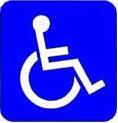The government – which, just occasionally, does something useful – has announced a proposal to change the eligibility criteria for the Blue Badge Scheme to include people with non-physical conditions. They mean people like My Loved One, who has to drag Ms Alzheimer’s with him wherever he goes, along with autism spectrum folk and other groups. It would give us access to disability parking.
The Blue Badge scheme, which has been running since 1970, has a framework set by central government but local authorities are responsible for its administration and enforcement. And there’s the rub. Their interpretation of the rules varies so whether or not you get a Blue Badge can be a postcode lottery.
Of course, you can see why some councils are reluctant to issue too many badges because the scheme is open to abuse, given how little parking there is everywhere for everyone these days.
Parking, moreover, is an income stream for councils. They’re already supposed to recognise non-physical conditions but many LAs employ “mobility assessors” who are concerned only with whether or not the applicant can walk. And I shall probably be shot down in flames for suggesting that if the Councils were to offer incentives to their assessors for finding most applicants ineligible then it would keep help to sustain the level of parking revenues – but that won’t stop me mentioning it.
Well soon, maybe, it will all be better. Jesse Norman, Parliamentary Under Secretary of State for Transport declares in her preface to the consultation document that “The Government believes that the Blue Badge Scheme should not discriminate in principle between physical and non-physical conditions”. Consultation runs until 18 March. Fingers crossed that we get the proposed changes and that Local Authorities don’t scupper it.
So why would a Blue Badge help MLO? He can still walk reasonably well, after all, although he’s slower than he was and inclined to shuffle in crowds and confined spaces because he’s frightened of falling or being pushed over. He’s also very nervous and cautious on staircases. Otherwise mobility isn’t really an issue.
Alzheimer’s is a complex, ill-understood, disease and – as these blogs often observe – does unaccountable things to brain function and that, obviously, affects the whole body because the brain is the body’s central computer. Here’s one odd but highly inconvenient thing: By the time MLO’s addled brain tells him he needs the loo there isn’t a lot of time to get to one.
If I drive him into say a large motor service station and have to park a long way from the building it can be – err – rather difficult for him to trudge the distance when “urgency” is biting. If, to make it easier for him I drop him at the door, by the time I’ve parked and walked across to find him he could will be wandering round the service station puzzling about where I am. And that’s tricky, especially at busy times when these places are crowded, because we both get panicky which probably isn’t good for either of us. If I could park in a disabled space near the door none of this would arise.
It would be easier in some town centre car parks too. Take the very large, busy one beside Chichester Festival Theatre. MLO, who sometimes comes with me, usually needs to get into the building quickly when we arrive at the end of our 70 mile journey but the only parking space I can find is typically 500 yards away. We don’t often take the car to a supermarket (deliveries are a great thing!) these days but when we do he’d be much better offloading himself as close to the entrance as possible.
The Blue Badge “belongs” to a person not to a vehicle so MLO would be able to take the facility with him if he was in someone else’s car – with either of our sons, for instance – when all the same potential problems are present.
Would I be tempted to abuse the system by using it when MLO is safe at home and I’m out by myself? Definitely not. Let me assure the London Borough of Lewisham – which would, if the changes go through, be responsible for assessing MLO for eligibility – that after a long time in the car I actually welcome a walk across a car park to stretch my legs. I am neither lazy nor any sort of cheat. I’m also lucky enough to be firing healthily on all cylinders. So if MLO were chez nous, so would the Blue Badge be.
Now let’s see some humane, common sensible changes in the assignment of Blue Badges. Soon please.
